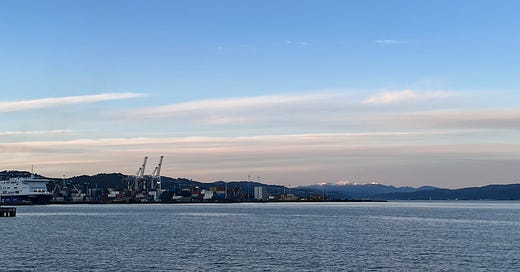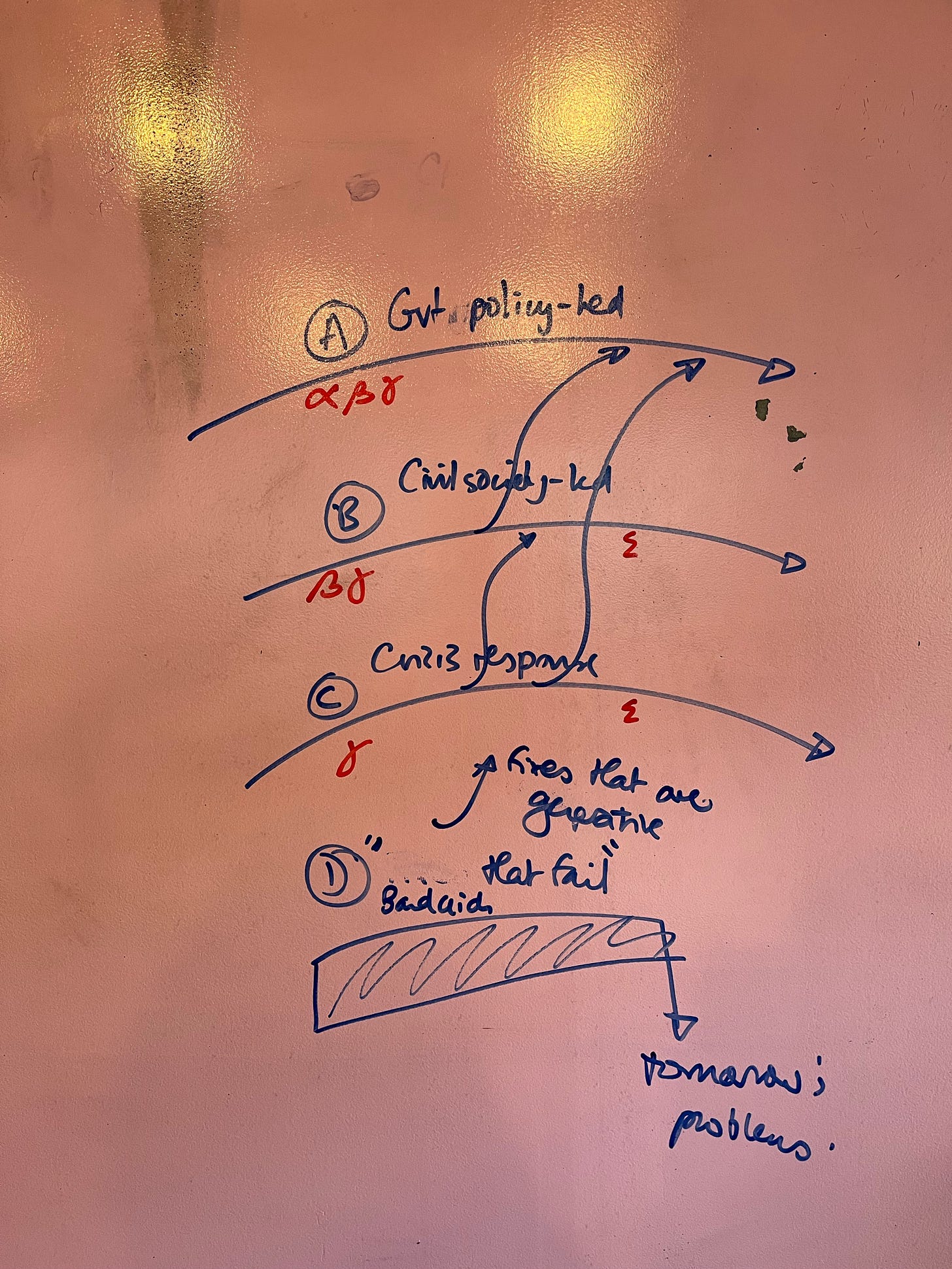Atelier WeekNotes w/c 29 July and 5 August 2024
INITIATIVES. Testing Influential Trajectories as Transition Planning Offer. Talk: 'Exploring What's Next: generating a better future'.
I am writing newsletter of #weeknotes of starting the Atelier of What’s Next (a studio for initiatives at the frontier of generating a better future). For my rationale for starting the Atelier see here.
Kia ora from Aotearoa New Zealand! I'm here with my family for a bit of work and a lot of holiday. Our plane from Wellington to Christchurch is delayed by fog. So, I have a spare 7 hours in the airport (the kids didn't want the stress of going back into town). All of which gives me the chance to do one more WeekNote this side of my holiday break.
What a week it was, of trying to contribute to Aotearoa New Zealand. As a reminder, I am here as part of being an Edmund Hillary Fellow. The Fellowship is a community of 500+ innovators, entrepreneurs and investors committed to New Zealand as a basecamp for global impact.
This WeekNote covers:
INITIATIVES
-Testing Influential Trajectories as Transition Planning Offer.
-Talk: 'Exploring What's Next: generating a better future'.
Huge thanks to systemic change agent extraordinaire Michelle Pawson (LinkedIn, Twitter) for making the introductions and otherwise putting lots of her own credibility on the line for me to do both of these. Thanks also to Prof Jonathan Boston for the invitation to give the talk.
The next WeekNotes might be for w/c 26 Aug or, more realistically, w/c 2 Sep.
How can the Atelier of What's Next be of service to you, and your purposes? We'd love to hear from you. Perhaps you have a challenge or idea to put in the studio. Maybe one of our existing topics appeals to you. What if you love to make new things happen by being part of the studio? Or if you have feedback or comments that would improve this deck. Either click the button below or email davidbent@atelierwhatsnext.org.
INITIATIVES
Testing Influential Trajectories as Transition Planning Offer
The first work-thing in Wellington was with the good folks of Rewiring Aotearoa, a 'think and do' tank which aims to electrify millions of fossil fuel machines by 2030.
We have started to work together on the role of a major bank in electrifying farming. This is a big deal: farming is a significant part of the national economy (larger than the UK) and a big part of exports (food and fibre was about 80% of all exports in the year to 31 March 2024). It is also the sector with hard-to-abate emissions (think: methane from cows) as well as being right-leaning and conservative (in all senses).
Over the last week, we piloted using Influential Trajectories as a way to generate more nuanced and multi-dimensional strategy for the bank to succeed commercially while electrifying the rural energy system.
Quick reminder, on Influential Trajectories:
Purpose: To create shared commitment to investments and initiatives that drive towards ambitious outcomes.
How: Imagine different trajectories from today to a future goal together (informed by latest systems transition theories), test each to see if the pre-conditions for exist, and then invest based on the results.
Acknowledgment. We are very grateful for the opportunity provided by Sustainable Shipping Initiative, and funding from Lloyd's Register Foundation, for the first pilot use in the State of Sustainable Shipping (SoSS).
In advance, I had to take my notes of what we could do, and turn them into workshop exercises.
There is more detail than I can realistically put into this WeekNote (though I will be adding the detail to the Influential Trajectories page here at some point). Some reflections:
A reminder and confirmation that a lot of the default systems transition language is off-putting. For instance, better to talk about the current mainstream, rather than The Regime.
Might be worth using the Technology Roadmapping question steps (from Phaal here).
Where do we want to go?
Where are we now?
How can we get there?
Why do we need to act?
What should we do?
How should we do it?
It is good to spend time describing what needs to be true in the future when the milestone is met.
I tried using a Milestone Wheel, a variant of the Futures Wheel. But that was probably a bit too blank canvas. Probably better to use PESTLE (Political, Economic, Social, Technological, Legal, Environmental).
It is possible, with prompts, to describe the dynamic status quo in terms of the Multi-Level Perspective (or MLP), so in terms of Landscape, Regime, Niche. (This is good news!)
But, capturing all of that on post-it notes gives rise to a list of stuff. Rather than a description of the patterns by which stuff repeats. Need a better way to capture the insights people have.
People struggle to come up with trajectories which are distinct from each other, and that have specific time series to them. Instead, they find it easier to give a generic story of pressures, which doesn't help unpack the assumed causalities. The prompts need to really push people to go through things step-by-step (in year 1, in year 2...), to force people to give their specific rationales.
Doing 'trajectories that fail' is very useful. Some of these are more likely than trajectories that lead to hitting the milestone, after all.
This is simply not ready for a hybrid approach.
I had high hopes of using the 12 Transformative Outcomes (effectively, the processes going on which drive change, more here). I think these can be building blocks, or perhaps a palette of paints, to help any specific trajectory to have detail. But we struggled to bring them in. I think partly because I hadn't really explained them in depth. More importantly, the 'now do a trajectory' instructions were all in one go, which made it hard to do the details. Need instructions which are more step-wise, and also have more visual supports.
Also, I had hoped to use more of the markers of S-curve / Wright's Law dynamics. For similar reasons, this didn't work.
The approach was able to cope with people having (slightly) different values and views on what was happening now, and what the underlying dynamics are. A good sign.
We did get to three quite different trajectories, and how they related to each other. (There was much more nuance underneath each than you would get just from the names.) That felt like a big success, in terms of surfacing what some people had thought previously, but probably no one had seen entirely, and certainly the group overall hadn't understand beforehand. More good news!
As a first pilot, there was too much in one 'mode' (basically, group brainstorming). Needs to move between different sizes of group, and different styles (language vs visual, creative vs analytical).
In the inevitable rush of a workshop (people always feel like they are running out of time), easy to miss out on a few important things, especially prompting for details which are more than economic and technological.
I had thought the 'Now create tests' would be a very different section, and that all tests would be about information that wasn't in the room. Instead, people were naturally coming up with tests as we went, and sometimes we knew the answer. So, need to have a test holding space from the start.
Now some photographic evidence.
Status quo in MLP terms on the left; the Future Milestone Wheel on the right. Even further right, hidden by the plant, is an action list.
The first ever trajectories!
How the trajectories relate to each other. So, (B) Civil Society-led and (C) Crisis response can flip into (A) Government policy-led. Trajectory (D) ‘Fixes Band aids that fail’ is the most likely to continue for some time, but could flip ‘up’ into (A), (B) or (C) by having ‘fixes that are generative’, as in they are mostly about the symptoms but do also go a bit ‘upstream’.
What became clear from the workshops was that Influential Trajectories has the potential to fill a gap in transition planning. Certainly in Aotearoa New Zealand (but, frankly, elsewhere) there is too little nuanced work going on how to get from today to a more secure and resilient future for different regions, sectors and/or economies.
WHAT NEXT
Continue working with Rewiring Aotearoa on making a Transition Planning 'offer', with Influential Trajectories as the primary motor.
Consider something similar, but for the UK. (Will need a partnership for that, I suspect.)
Put the first workshop guides up on the Influential Trajectories
Talk: 'Exploring What's Next: generating a better future'
The other major piece of work in the week was to deliver a talk at the the Wellington School of Business and Government, Te Herenga Waka Victoria University of Wellington, co-hosted by Institute of Public Administration New Zealand (IPANZ).
This past WeekNotes entry has a bit more background and the first draft structure. Eventually, the outline was:
The first 20 years: corporate and technocratic change; into personal crisis and exploration.
Towards an understanding of what is going on.
Audience exercise.
The next 20 years: exploring what’s next.
Q&A
Key messages:
We are living in a time of connected, escalating crises, of which climate change is but one example.
We will need to transform our our social, political and economic context for billions to live their own version of the good life.
No one knows how to do ‘transformation’, yet. We will need to learn-by-doing.
It is going to rough, messy, scary, political – and also galvanising, generative, meaningful.
Humankind has been astonishingly adaptive. We can all learn to explore and generate possibilities.
Some of the content will be familiar to long-time subscribers. I used the module lecture on 'The only viable story of the future is transformation' here, and also the Depth of Change spectrum (as used in a different UCL module, see here).
The recent report from the Institute and Faculty of Actuaries on Climate Scorpion – the sting is in the tail allowed me to push harder on the insight that the risks and costs of maintaining the status quo are lower than the risks and costs of attempting transformation.
I was also able to bring in Graham Leicester's permission slip (see WeekNote 6 May 2024) and From Philippa Hardman and Chris Nichols's distinction between navigating and exploring (from their book ‘Disrupted!: How to Create the Future When the Old Rules are Broken’):
My concluding slide was my late wife, Jo, describing her way of trying to make a difference as a child and adolescent psychotherapist:
‘I find it helpful to keep in mind the three Ancient Greek 'gods' of time:
Chronos: exercising some control through the boundaries of chronological time.
Kairos: in order to allow opportune moments to arise.
Aion: while in communication with the timeless unconscious.’
As far as I can tell, it went down well. There were about 50 people in the room, and another 70 on Zoom (apparently). The were murmurs of agreement at points, and good questions at the end. I had a few people come to me afterwards with very positive comments. So, that's nice.
You can download a pdf of the slides here. (The presentation itself has far more builds than the pdf.)
WHAT NEXT
Write up the talk.
Send on the link of the recording when that comes out.








